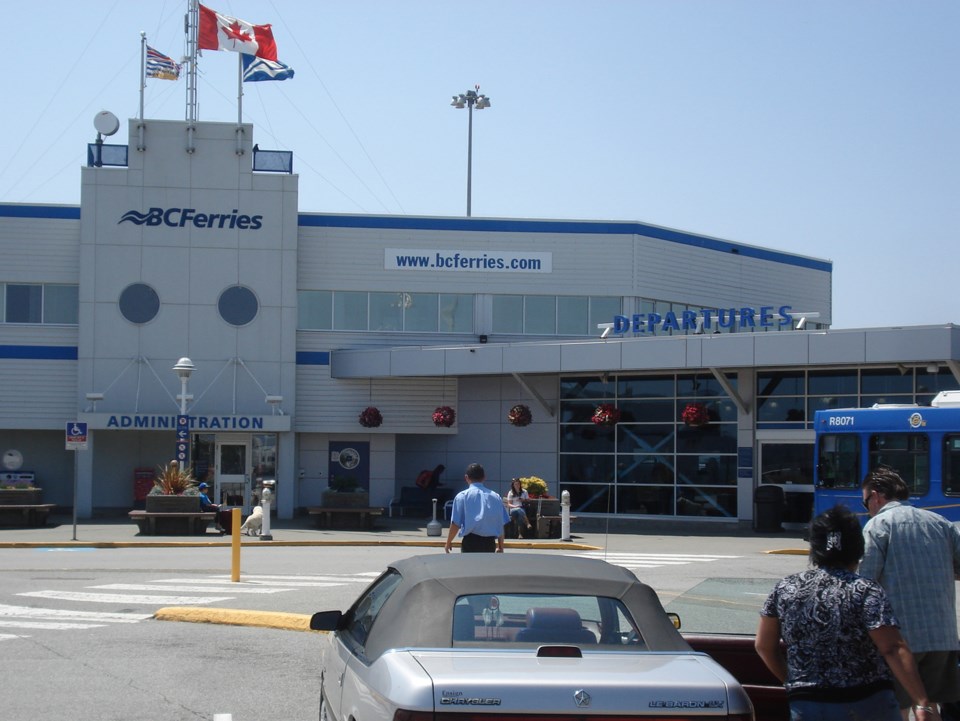Should ferry users who are not foot passengers be required to remain in their automobiles?
How about more extreme measures including stringent travel restrictions during the COVID-19 pandemic?
It remains to be seen if it will be even more difficult to travel on B.C. Ferries, currently in Phase 4 of its pandemic response plan, which announced further temporary sailing reductions Friday.
It’s been a couple of weeks since Transport Canada and the Canadian Ferry Association worked out a rule change, for the time being, to allow vehicle passengers to remain in their cars on the enclosed lower decks, if they choose.
“We are strongly advising passengers to stay in their vehicles, regardless of their car deck, during the crossing. If you must come up to the passenger decks, please maintain physical distancing on board, and stay at least two metres away from employees. Our crew are making announcements asking customers to stay in their cars, distance themselves if they must come upstairs and wash their hands,” B.C. Ferries states.
B.C. Ferries hasn’t indicated it is considering making it mandatory and what other measures are being considered to help keep its workers safe, as well as slow the spread of the virus.
Spokesperson Deborah Marshall referred the Optimist to the B.C. Ferries advisory on ferry service in April as well as the COVID-19 section on their website.
During Mayor George Harvie’ s virtual town hall meeting at city hall this Thursday, Delta South MLA Ian Paton said he’s been told by ferry employees they are concerned about people leaving their vehicles and going to the upper deck.
Following directions provided by the Public Health Agency of Canada and other health authorities, Ferries recently advised people to avoid non-essential travel, which has resulted in a decline in passenger volumes, but hasn’t gone so far as to restrict travel.
The ferry corporation in a previous news release says it has not been instructed, so far, to restrict travel.
According to the B.C. Pandemic Provincial Coordination Plan, a document updated this February, three levels of transportation service have been identified to address emergency operational situations during a pandemic.
The first is full service and unrestricted movement of people and goods, while the second is partial service restricting the movement of people and goods based on inability to fully staff and/or reduced services restricting movement due to a public health officer order.
The third is a temporary cessation of any service that facilitates movement of people and/or goods due to insufficient staffing levels or by public health officer order.
The plan also lists inland ferries as one of the transportation ministry’s “mission critical services.”
B.C. Ferries has already reduced service between Vancouver and Victoria and, with many sailings now thin on passengers, further reductions were announced Friday including service between Departure Bay and Horseshoe Bay suspended for 60 days.
As far as the Tsawwassen terminal, the revised scheduled includes:
Tsawwassen – Swartz Bay: four departures from each terminal daily
Tsawwassen – Duke Point: four departures open to the public from each terminal daily
Tsawwassen – Duke Point: four cargo-only departures from each terminal daily (Mon – Fri)
"During this time, B.C. Ferries will monitor service levels in conjunction with the Province to ensure essential service levels are maintained and to determine when services should resume to normal levels," B.C. Ferries explains.
The ferry corporation says commercial traffic is the priority.
In a video message, CEO Mark Collins said, “B.C. Ferries will continue to transport the goods your communities rely on, and we will get people to where they need to go.”
Noting it provides a lifeline to remote and to coastal communities in B.C. and will continue to provide vital services, such as delivering medical supplies and groceries, as well as transporting emergency workers, doctors and nurses, Ferries is also asking customers if they are feeling sick not to travel on a vessel.
B.C. Ferries last week confirmed a worker based out of Tsawwassen contracted COVID-19 but that employee didn’t work on public areas, so the risk to the public was low.



